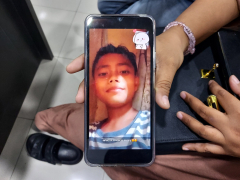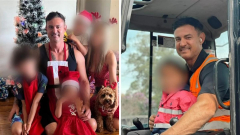Sidoarjo, East Java – Dewi Ajeng was at home in Probolinggo – a city in Indonesia’s East Java – when she received a chilling message in the group chat of her son’s school in Sidoarjo, located some two hours away.
There had been “an incident”.
Recommended Stories
list of 4 items
- list 1 of 4Video: Rescue & recovery efforts continue after Philippines earthquake
- list 2 of 4Rescuers race to save survivors of Indonesia school collapse as quake hits
- list 3 of 4Photos: Death toll rises to 72 after powerful earthquake in Philippines
- list 4 of 4Al Jazeera reports from scene of Philippines earthquake in Cebu
end of list
The Al-Khoziny Islamic Boarding School had collapsed, trapping the young students, all boys, mostly aged between 12 and 18 years old, inside.
Dewi’s 13-year-old son, Selendra Haikal Rakaditya, was among those buried beneath the rubble.
“I just felt a range of mixed emotions. I was sad, frantic, crying. Then my husband messaged me to confirm the news,” she told Al Jazeera.
“I called my friend in Sidoarjo and told her to go to the school and find him, and that I was on my way.”
Dewi arrived at about 5.30pm, about two hours after the school collapsed during afternoon prayers.
Her son, Haikal, had not been found.
The names of children who were rescued and taken to different hospitals in the Sidoarjo area were pinned to large notice boards set up by search and rescue teams.

“There were six ‘Haikals’ on the lists and I went to every hospital trying to find out if my son was there,” Dewi said.
“Then someone sent me a video from the scene and I could hear a voice shouting, ‘Mama, mama, mama,’ and I thought, ‘Thank God, that’s him, he’s calling for me’,” she said.
“From then on, I focused on the scene of the collapse. I just knew he was in there, and I told the search and rescue teams that he needed to be rescued.”
But a rescue would not be easy.
Young Haikal was trapped inside an air pocket under the fallen debris with five other pupils. He was the second closest to a jagged escape route through gaps in the rubble. But the way out was blocked by the body of one of Haikal’s friends, who died due to the force of the building collapse.
There was no way for Haikal to crawl out, or for the rescuers to squeeze in and reach him.
‘I was crying, screaming. I just kept praying’
The difficult rescue effort took three days – a terrifying time for Dewi as members of the search and rescue teams fought to reach her son. A brief moment of hope arrived when they were able to create a shaft through which they passed bread and water to the trapped students.
Almost exactly 72 hours after the boarding school collapsed, Haikal was brought out of the debris by rescuers and placed on a stretcher. Dewi told Al Jazeera that rescuers advised her not to look at her son, and instead go straight to the local hospital to see him.
“When I got there, I don’t even remember what happened, I was crying, screaming. I just kept praying. When I finally saw him, I just thanked God. He had withstood everything for 72 hours. He had made it,” she said.
Slowly, Dewi said, her son told her what had happened.
He had almost finished afternoon prayers on the second floor of the boarding school on Monday when chunks of the ceiling started to fall on the boys.
“Then he heard a cracking sound and the building caved in completely. He said he f





